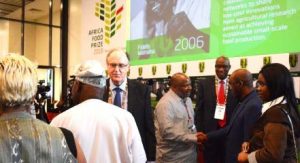Feed Africa: Stakeholders zero in on partnerships for technology delivery
1 October 2018
Key stakeholders in Africa’s agricultural sector have identified partnerships for sustainable agricultural technology delivery as a critical factor in Africa’s quest to feed Africa.
DG Nteranya Sanginga being congratulated by AGRF participants.
This came out strongly at a breakfast session that heralded the presidential summit of the 2018 African Green Revolution Forum (AGRF) in Kigali, Rwanda’s capital city.
Organized by the ClearingHouse of the Technologies for African Agricultural Transformation (TAAT), an initiative of the African Development Bank’s Feed Africa Strategy that aims to achieve major agricultural transformation in Africa, the session had in attendance, African agriculture ministers, scientists, representatives of multilateral development banks, donor partners, and the private sector.
Dr Mpoko Bokanga, Head of the TAAT ClearingHouse, in his opening statements, traced the program’s history to the October 2015 Dakar High Level Conference on Africa Agricultural Transformation Agenda, which led to the adoption of 4 goals and 18 action points to transform African agriculture.
With a focused approach on integrated development of agricultural value chains, Bokanga highlighted the main objective of TAAT which is to “take proven agricultural technologies to scale in a commercially sustainable fashion through the establishment of a mechanism to facilitate partnerships.”
Innovative approach in partnerships
TAAT, according to Bokanga, is not an addition to Africa’s long list of agricultural initiatives but an innovative program that serves as a clearinghouse for sustainable agricultural technology delivery.
Through its components, the program will promote an enabling environment for technology adoption; establish a regional technology delivery infrastructure to accelerate delivery; and raise Africa’s agricultural productivity by deploying proven agricultural technologies at the agroecological and country levels in strengthened agricultural value chains.
The Togolese Minister for Agriculture, Livestock and Fisheries, Ouro-Koura Agadazi was full of praises for the AfDB and IITA for this well thought-out program, which according to him, “carries the prospects of transforming Africa’s agricultural landscape.”
Hon. Joseph Mwanamvekha, Malawian Minister of Agriculture, Irrigation and Water Development, commended the partnership between IITA as the executing agency and the over 10 research institutes and centers driving the implementation of the TAAT program.
Also underscoring the imperatives of partnerships for sustainable agricultural technology at the breakfast session were representatives of the International Fund for Agricultural Development (IFAD), the Alliance for a Green Revolution in Africa (AGRA), and IITA.


